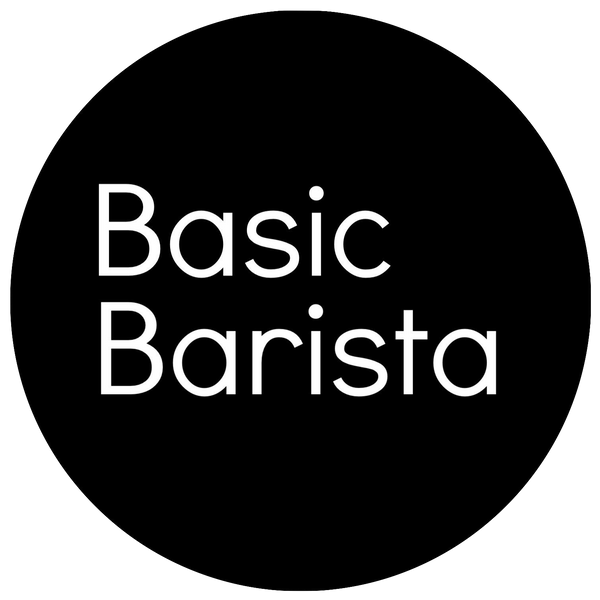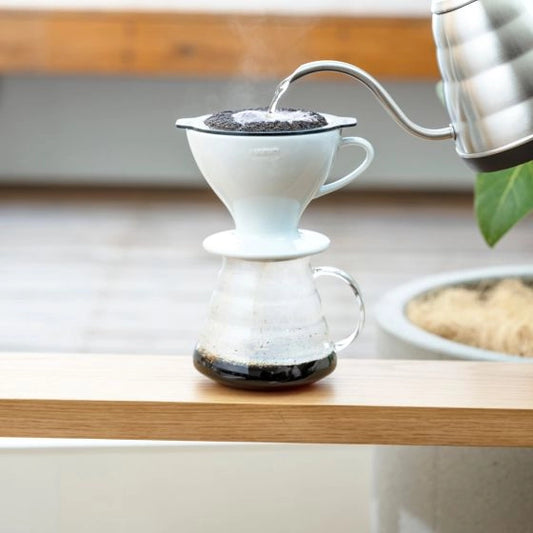
Freezing Coffee Beans - Barista Basics
Share
Have you ever found yourself with too much coffee? Maybe you tasted a coffee many years ago and it changed your out look on what coffee could be.
What if I told you there was a way that was to capture and store your coffee to enjoy for years to come and anybody who owns a freezer has the ability to do this.
Welcome to the rabbit hole of frozen coffee.
Why You Should Freeze your Coffee Beans
When delving into the world of coffee there are so many different variables to learn about besides the brewing. I would argue that one of the most valuable techniques you could learn is how to correctly store your coffee to ensure you have the freshest beans available to you at all times.
Freezing coffee beans has emerged as a relatively new method that might seem unconventional but when you consider why we use freezers in the first place it really does make sense.
To understand why freezing can improve the lifespan of your coffee beans you first have to understand how your coffee ages, this will give you better insight into how to control the ageing process.
How Coffee Ages
Coffee beans are rich in oils, flavour and aromatic compounds, which are responsible for the flavours and aroma we all love so much. However, these compounds are sensitive to environmental factors like air, moisture, light, and temperature. Over time, exposure to these elements causes coffee beans to stale, losing their flavour and freshness. Oxidation, moisture absorption, and the degassing of CO2 play key roles in this ageing process but can quite simply be avoided.
To reduce the moisture, air, light and temperature you have a couple of different options, our favourite and the most environmentally friendly option being single dose centrifuge tubes.
Different Coffee Storage Options
Traditionally, coffee is stored in airtight containers at room temperature or for cafes, it isn't abnormal to see coffee left sitting in the hopper above the grinder. While this method can preserve beans for a short time, it doesn't halt the ageing process and constant exposure to new air is actually quite a large contributor to ageing coffee beans.
Store Coffee in Coffee Bag
In most cases when purchasing coffee beans they will be sent to you in a bag that is either clip able or resealable via a zip lock or some other means. This can be a great way to store your coffee but only in certain scenarios.
The only time I would store coffee in the freezer is if I had multiple bags of coffee on hand and I didn't plan on constantly opening and closing the bag to remove coffee every day.
Store Coffee in Air-Displacement Container
There are a couple of different air-displacement containers available on the market to store your coffee beans.
These work by placing your coffee beans in and then physically pushing majority of the air out of the container, once the insert hits the beans and can not be pushed any further you are physically limited to how much air you can remove and this doesn't make a vacuum seal.
I would consider using this for certain situations such as when a cafe closes for the day and is left with extra coffee in their hopper, instead of leaving the coffee in the hopper add this to your Airscape canister and remove the air.
I would say that this is less ideal compared to a vacuum sealing container but for fresher coffees and espresso roasted coffees that only need to be stored overnight once I think this is a great option.
Unfortunately while these do offer a great way to store your coffee beans, most Air-Displacement Containers are not suitable to be used in a freezer.

Store Coffee in Vacuum Container
Vacuum Canisters are a fantastic option for storing coffee and they are similar to the Air-Displacement containers however are so much more effective in removing the air that surrounds your coffee beans. Vacuum Containers are usually available in a range of different sizes appropriate for all sorts of consumers (at home coffee brewers all the way to Cafes with lots of left over coffee beans.) Vacuum Containers are also much more environmentally friendly compared to vacuum sealing coffee in single use plastics however they are limited to not being able to single dose your coffee beans and that you can really only store 1 coffee at a time in each container.
Unfortunately while these do offer a great way to store your coffee beans, most Vacuum Containers are not suitable to be used in a freezer.
Vacuum Seal Coffee Beans
Vacuum Sealing Coffee Beans in plastic is a great way to store your super special coffees in the freezer. It removers all the air from your dose of coffee beans and it is able to easily fit into your freezer. By Vacuum sealing you are also able to single dose or batch freeze your coffee.
The issues with Vacuum Sealing single doses of coffee beans and even by batch freezing your coffee beans is that the plastic sleeves are prone to breaking and loosing their seal. Besides this, the waste is substantial compared to using any other method we mentioned so far.

Single Dose Coffee Beans in Tubes
Another option you have is to Single Dose your Coffee Beans in centrifuge tubes, This is a great way to freeze your coffee, it is also much more environmentally friendly and for cafes it is a much faster and efficient way to store and use coffee as the tubes screw open and closed and can be pre dosed prior, this means that you don't even need to worry about weighing your coffee while in a rush.
Our centrifuge tubes can fit around 20g of coffee and do leave a small amount of head room, however when storing smaller doses like 15 or 18g of coffee (usually for single brews of filter coffee or smaller portafilters) this head room really opens up and can start to negatively impact your coffee.
It is noteworthy that this has been contested and there are people in the coffee industry who say that this head room can be a good thing and helps to create a buffer for your coffee beans.
Single Dosing Coffee Beans
Single dosing coffee beans involves weighing out individual portions of coffee beans into centrifuge tubes, these tubes are then labelled and pre-dosed to be the same weight that you plan to use to brew coffee with. This approach is particularly beneficial for coffee enthusiasts who don't consume large amounts quickly. By freezing single doses, you can thaw only what you need for each brew, ensuring a fresh batch every time.
Single Dosing Coffee Beans is also super popular for cafes and coffee bars offering single origin coffees, Decaf or even some top of the line limited edition coffees that can now be offered to customers all year round.
When to Freeze Your Coffee
The best time to freeze your coffee will vary on a couple of different factors, the most important factor is the roast date and how long the coffee has had to age.
As you may already know, coffee beans are at their freshest as soon as they are roasted (represented by the 'Roast Date'). The first week after coffee is roasted we call the 'Ageing' or 'degassing period', this period of time allows for your coffee to degass and remove extra co2 before your coffee is ready to be brewed.
If you have ever tried to brew coffee that is too fresh you may have noticed lots of bubbles and what seems to be a never-ending 'blooming' of your coffee. While this visually looks amazing, your coffee is not extracting propperly and the taste of your cup can reflect this.
The Easy Answer:
We recommend allowing your coffee to degass and age for 1-2 weeks before freezing, this gives your coffee the best chance for success when you brew your coffee at a later date.
The Advanced Method:
A better and more precise method to finding out the best time to freeze your coffee is to brew and taste your coffee at different stages of the ageing process (Week 1, 12 days, 15 days, 18 day, 20 days, etc). This will help you to identify the optimum date range of peek freshness, however the issue with this is that once you know when your coffee is at it's peak you are unable to turn back time and freeze the remainder of your coffee. I would only ever recommend this if you have heaps of the same coffee time and time again, or for special circumstance such as competing.
Does Freezing Coffee Affect the Taste?
One common concern is whether freezing changes the taste of coffee. The consensus among many coffee experts is that when done correctly, freezing does not significantly impact the taste. In fact, freezing coffee beans helps to retain the coffees original flavour profile by slowing down the ageing process.
It is important to note that some variable that can effect this are:
- Air - Repeat exposure to air and how much head room is with the coffee.
- Light - If your coffee is exposed to light when opening and closing the freezer.
- Moisture - Moisture content in the Freezer and in the container with the coffee dose.
- Temperature - Different levels of temperature will effect how well the coffee sample is frozen, as well as the frequency of temperature (defrosting of freezers etc).
How Long Can You Keep Coffee for When Frozen?
Frozen coffee beans can last for several months to many years without significant degradation in quality. However, it's important to store them in airtight, moisture-proof containers such as the options we listed above to prevent freezer burn, exposure to new air and moisture absorption.
It is because of this reason alone that makes freezing coffee such an attractive concepts for roasters, cafes, coffee bars and even home consumers. The coffee community in particular is known for being such a well caring and sharing community with so many stories being repeated and shared, freezing coffee allows us to continue sharing age old coffee stories for future years.
Should You Vacuum Seal Your Coffee Beans?
Vacuum sealing is an excellent way to freeze coffee beans. It removes most of the air, one of the primary culprits in the ageing process, and creates a nearly perfect environment for long-term storage. This method is especially useful for those who buy coffee in bulk and want to maintain its freshness over time. Vacuum sealing coffee also has it's limitations, the biggest being the environmental impact and single use plastics as well as machinery needed to create the vacuum seal.








3 comments
Is there a temperature that is best suited for freezing them, or is just below freezing good enough?
Good read. Have you noticed any flavor change when making pour over coffee from frozen beans. Thanks
Wow, this is so great.
Thanks for this Just what I am looking for